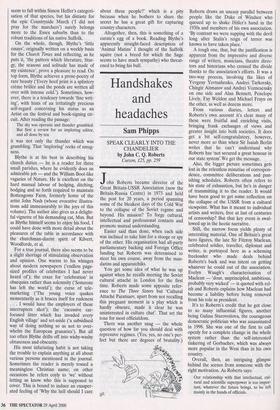Handshakes and headaches
Sam Phipps
SPEAK CLEARLY INTO THE CHANDELIER by John C. Q. Roberts Curzon, £25, pp. 259 John Roberts became director of the Great Britain-USSR Association (now the Britain-Russia Centre) in 1973 and held the post for 20 years, a period spanning some of the bleakest days of the Cold War to the collapse of the Soviet regime and beyond. His mission? To forge cultural, intellectual and professional contacts and promote mutual understanding.
Easier said than done, when each side was inclined to take him for a stooge or spy of the other. His organisation had all-party parliamentary backing and Foreign Office funding but Roberts was determined to steer his own course, away from the man- darins and apparatchiks.
You get some idea of what he was up against when he recalls meeting the Soviet cultural attaché in London for the first time. Roberts made some apposite refer- ence to The Three Sisters but 'Cultural Attaché Paratsaev, apart from not recalling this pregnant moment in a play which is hardly obscure, made it clear he was uninterested in culture chat'. That set the tone for most officialdom.
There was another snag — the whole question of how far you should deal with .repressive regimes. (Yes, yes, no one's per- fect but there are degrees of brutality.) Roberts draws an uneasy parallel between people like the Duke of Windsor who queued up to shake Hitler's hand in the 1930s and members of his own association. 'By contrast we were supping with the devil long after Stalin's reign of terror was known to have taken place.'
A tough one, that, but the justification is apparent from the impressive and diverse range of writers, musicians, theatre direc- tors and historians who crossed the divide thanks to the association's efforts. It was a two-way process, involving the likes of Yevgeny Yevtushenko, Andrei Tarkovsky, Chingiz Aitmatov and Andrei Voznesensky on one side and Alan Bennett, Penelope Lively, Fay Weldon and Michael Frayn on the other, as well as dozens more.
From various diaries, letters and Roberts's own account it's clear many of these were fruitful and enriching visits, bringing frank exchanges of views and greater insight into both societies. It does get a bit self-congratulatory, however, never more so than when Sir Isaiah Berlin writes that he can't understand why Roberts has 'not secured a great honour in our state system'.We get the message.
Also, the bigger picture sometimes gets lost in the relentless minutiae of correspon- dence, committee deliberations and pun- ishing schedules. Roberts often refers to his state of exhaustion, but he's in danger of transmitting it to the reader. It would have been good to get some reflection on the collapse of the USSR from a cultural viewpoint. What has it meant to individual artists and writers, free at last of centuries of censorship? But that key event is swal- lowed up in the hectic narrative.
Still, the narrow focus yields plenty of interesting material. One of Britain's great hero figures, the late Sir Fitzroy Maclean, celebrated soldier, traveller, diplomat and writer, is portrayed here as a scheming freeloader who made deals behind Roberts's back and was intent on getting whatever he could out of the association. Evelyn Waugh's characterisation of Maclean — 'dour, unprincipled, ambitious, probably very wicked' — is quoted with rel- ish and Roberts explains how Maclean had become a liability before being removed from his role as president.
It's to Roberts's credit that he got close to so many influential figures, another being Galina Starovoitova, the courageous democratic politician who was assassinated in 1998. She was one of the first to call openly for a complete change in the whole system rather than the self-interested tinkering of Gorbachev, which was always more popular in the West than in his own country.
Overall, then, an intriguing glimpse behind the scenes from someone, with the right motivation. As Roberts says: Our relationship with that intellectual, cul- tural and scientific superpower is too impor- tant, whatever the future brings, to be left mainly in the hands of officials.


























































 Previous page
Previous page